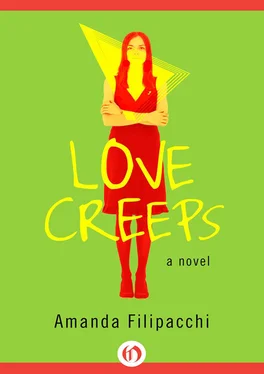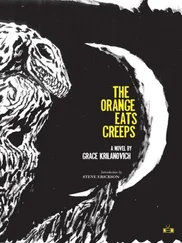“Yes. She had my things!” Roland said.
“What things?” Ray asked.
“The things I’ve been dropping for years.”
“You’ve been dropping things?”
“Yes.”
“What kinds of things?” Alan asked.
“Buttons, paper clips, pennies, movie stubs.”
“How often?”
“Every day. Many times a day.”
“Where?”
“Wherever I happen to be. Usually as I leave a place.”
“On purpose?”
“Utterly.”
“Littering?”
“No, losing.”
“Why?” they all asked at the same time.
“In order to find something more precious.”
“Like what, a woman who’ll pick up after you?” Lynn said.
“No.”
“Then what thing more precious?” Alan asked, holding his Virgin Mary. “What is this vague bullshit explanation?”
“I don’t know,” Roland replied, sipping his white wine. “All I know is that I always go around with something to lose. I can’t stand having nothing to lose. I can never leave a place without leaving something behind, even if it’s just lint from my pocket. Otherwise, I experience discomfort. If you’ve got a better explanation, then tell me.”
“Yes, I’ve got one,” Alan said. “You lose things. Hence, you’re a loser.”
“I lose things on purpose.”
“Well, then, you’re a double-duty loser.”
“No,” Ray said. “The subconscious reason you were dropping things was to give anyone who wanted to meet you an excuse to. It was your way of reaching out to people. You wanted people to have access to you despite your cold facade.”
“Maybe,” Roland replied. “But then why did I sometimes drop things where no one could approach me, like in the middle of the ocean?”
“Dropping things had become a compulsive habit,” Ray said. “Since you weren’t exactly aware of why you were doing it, it’s logical that you would sometimes do it when it didn’t make sense. No?”
“God, you should have been a therapist,” Lynn said, impressed.
“Yeah, I was.”
“But you said you were a locksmith!”
“I lied. I was a psychologist.”
“Why didn’t you tell us?”
“Various reasons.”
“How did you become homeless, if you were a psychologist?” Alan inquired.
“I was a bad psychologist.”
“Bad how?” Roland asked.
“Oh …” Ray hesitated.
“Did you analyze people poorly?” asked Lynn.
“No …”
“You gave bad advice?” Roland guessed.
“No …”
“Did you betray confidences?” he guessed again.
“No …”
“Then what?” asked Alan.
“I asked too many questions.”
They thought he was commenting on their interrogation of him. “Oh, come on, tell us!” said Lynn.
Ray was confused. “I just told you. I asked my patients too many questions.”
“But a therapist is supposed to ask a lot of questions!” Alan said.
“Yes, a lot, but not too many. I asked too many. Too often.”
“What do you mean, too often?”
“I’d call them up every hour at home and ask for updates.”
“Oh.”
“But I was pretty good at analyzing behavior and giving advice. Roland, if you had told me sooner of your compulsive habit of dropping things, I could have helped you understand it.”
“That’s easy for you to say,” Roland replied. “If you had told us sooner that you were a therapist, I might have told you of my habit.”
“It’s a good thing neither of you did,” Lynn said, “because if you had, Ray might have cured you of your compulsive habit, and prevented you from ever meeting your soulmate.”
“Hey, Roland,” Alan said. “See, didn’t I tell you things would work out for you? I predicted you’d not only survive the ocean but probably also have a happy life. Just because you’re an asshole doesn’t mean you’ll ever suffer for it or be punished. And what about me? I’ve made a real effort to turn my life around and be a good person, and what do I get? I’m all alone and unhappy, and I’ll probably never meet anyone.”
“Yeah, you might be right,” Roland said. “You make a convincing argument.”
“I comforted you in the water. Why do you have to be so negative?”
“I thought you were just being truthful back then. Now I’m just being truthful back — realistic,” Roland said. “It’s true that life’s unfair. I didn’t deserve to meet this amazing woman. I don’t really deserve to be happy. But she does. And I want to make her happy.”
Alan was jealous of Lynn and Roland. He wanted to meet his soulmate, too. Now that Lynn and Roland had experienced the same magic, they probably expected it of him. He felt the pressure. And it was not agreeing with him.
He told them that he was worried because he didn’t have a secret “real” name or a secret wacko habit that only his soulmate could recognize. So what was he supposed to do?
Lynn replied, “You probably have one without realizing it. Everyone has secret quirks.”
“Well I don’t! All my quirks are visible.”
“Don’t worry, somehow it’ll happen,” she said. “And if it doesn’t, that’s okay, too.”
He was afraid it would not happen, afraid he would be discontent forever. It wasn’t fair. It drove him crazy, this trend, this craze of soulmates popping up. He started acting erratically.
He went around doing all sorts of weird takeoffs on what the two others had done. He invented various quirks for himself, and rituals, to see if his soulmate would recognize him. For example, he threw fistfuls of rose petals in the faces of women walking down the street, then watched for their reactions. When that didn’t work, he tried throwing Godiva chocolates up in the air and behind him while walking down crowded Fifth Avenue, and then he would turn around to see if a woman had been hit, or perhaps had even caught one, and seemed taken with him — his soulmate. But no. People were either brushing cocoa powder off themselves and looking annoyed, or looking at the ground in surprise where a chocolate truffle had landed. Since nothing good came of that plan, he engaged in his next one. He bought small diamonds, rubies, sapphires, emeralds, and opals, and threw them lightly in women’s faces.
He also considered walking around with his rat, holding it out to women like a soulmate detector, to see if any of them were charmed. But what was the point — if petals, chocolates, and precious stones hadn’t worked, why would a rat? So he persevered with the pelting.
When Lynn, Roland, and Ray heard about what he was doing, they tried to explain to Alan that their own quirks were not manufactured.
And he said, “Well, I do have a natural quirk. I lightly stone women with beautiful little rocks. Why can’t you accept that’s my natural quirk?”
“You are crazed,” Ray said to him with concern.
“So I’m romantically doomed because I don’t have any hidden quirks, is that it?” He was having this conversation with them from jail, where he was being kept overnight after having finally been arrested for throwing stones.
Lynn brought her soulmate, Jim, to art openings and dinners and parties. When people asked him what he did, Lynn didn’t mind that he was a florist and that he said so. She was proud, in fact. He was so obviously charming and intelligent that being a florist only added appeal in her judgment. And her judgment was excellent.
Ray, Lynn, and Alan found a couple of nicknames for Roland’s girlfriend, Victoria. One of them was “the Translator,” because, as Lynn put it, “She translates this French asshole into a nice person.” They also nicknamed her “the Picker-Upper.”
The Translator saw what was great about Roland and enabled other people to see it, too. If Roland did or said something that seemed unappealing, she’d be able to explain why it was actually appealing, or she’d simply rephrase his obnoxious statement in a manner that made it convincingly pleasant. She never opposed. She skewed.
Читать дальше












